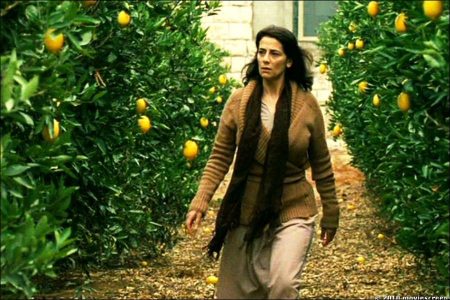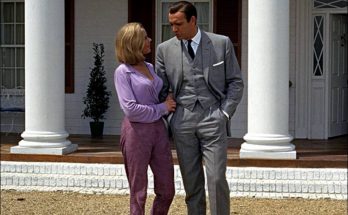Israeli films. Eran Riklis is another director on the Israeli-Palestinian issue on the screen, and with the film Lemon Tree, the director tries to explain Israel’s settlement policy through the Palestinian Selma’s Lemon Garden. Selam’s lemon orchard poses a security issue for its new neighbor, the Israeli Defense Minister, and Israel’s settlement policy is criticized by considering the legal process that Selma resorted to in order not to cut lemon trees.
The security problem created by lemon trees in a sense refers to the paranoia and fear of Israeli society. Inadequate security measures for Israeli society are exposed. As a matter of fact, the living spaces of the people under the name of security measures are raped by Israel and the occupations, the lands seized with the excuse in question, legitimize the settlement policy. In fact, the invasion of the State of Israel after 1948, the subsequent wars and the final peace agreements, led Israel to put security measures as the primary condition for every sitting table and demanded it from the states it has settled.
Israel tried to create an open-air prison for Palestinians where they lived and to keep the Palestinians under observation. In this respect, the director’s film Lemon Tree made a correct determination and criticized the Israeli settlement policy. The dialogues in the film are criticized by the director and the right of the displaced Palestinians under the name of security measures is emphasized.
The Lemon Tree is approaching the Israeli-Palestinian problem from the perspective of the Palestinians, as long as Selma approaches the struggle for resorting to all legal means for the security of the Minister, not to cut lemon trees, and Israeli settlement policy is criticized by an Israeli director. Throughout the film, Selma and her case become a Palestinian cause. The Palestinian people are rebelling over the representation of lemon trees.
Another Israeli director, Amos Gitai, is in the face of an anti-war production with the 2000 film Kippur, and deals with the Palestinian-Israeli Question in a unilateral perspective. In an interview with Gitai, while describing her responsibility for handling political issues such as war and exile, she says, iniz Your thoughts may be different, but we should never take action to harm others.
While Kippur emphasizes that love is more important than war, he creates the expression without showing ekil others, and does not show “others” throughout the film. The film develops on a real event and the main subject of the film is the Yom Kippur war in 1973. While the main characters of the film, Sergeant Weinraub and Lieutenant Ruso, are trying to reach their troops, the depiction of the war is made with empty streets and an image of an abandoned city.
The film tries to tell people what they have lost in all circumstances and emphasizes that there is no winner in the war. Despite all this, the director shows the brutality of the war only through the wounds of Israeli soldiers and is inadequate to look at the events from both sides. The film as a whole takes place on the fronts where the war took place and where the Israeli soldiers collided, with only the Israeli soldiers and their tragic images throughout the film. In the opening and closing scenes of the film, instead of fighting, the reference is made to the importance of love and at this point the film has an anti-militarist discourse.
If we consider the film as a whole, it can be said that Kippur tried to look at the Philistine-Israeli Question from the perspective of the Arab-Israeli War of 1973 and was realized by the surprise attack of Syria and Egypt, who lost their lands in the 1967 war. Israel, which occupied the West Bank and Gaza in 1967, developed its colonization policy and quickly settled new settlers in these regions. The defeat by the Arabs led to the ongoing problems in the region even today.
The fact that Amos Gitai was actually a soldier who participated in the war of Kippur brought realism in the way the film was processed, and it was tried to be expressed with images that the war meant nothing but pain and nothingness and a successful narrative was made at this point. Although the 1973 Kippur war was not a direct Palestinian-Israeli issue, it was indirectly the intervention of two states (Syria-Egypt) active in the Palestinian Struggle, and the 1967 Arab-Israeli war was the trigger point. Therefore, the film should be evaluated on the axis of the Palestinian-Israeli question. Throughout the film, the war between Israel and the Arabs cannot be solved.
Although there are directors who try to prove the rightfulness and legitimacy of the occupation, there are some directors who try to be sensitive and sensitive to the problem among the Israeli films produced in recent years. There has been a significant increase in the number of humanist productions in Israeli cinema in recent years as well as films shot with a nationalist approach.
Directors such as Ari Folman, Amos Gitai and Eran Riklis have been able to criticize the system of their country and express their discomfort through cinema. Only the sensitive and sensitive approaches of these directors can be obstructed at some point, and the increasing pressure of the State of Israel against the problem-sensitive people leads to some inadequacies in the expression of these directors. For this reason, these directors who try to make films in political cinema do not show the courage they desire, and they have some problems to look at similar events from two sides.
Next Page: Israeli-Palestinian Issue in Palestinian Cinema
Views: 239



